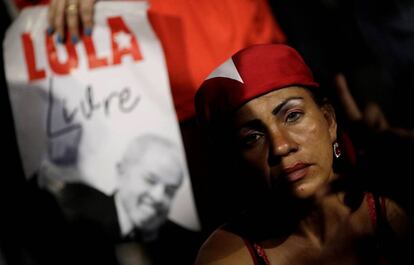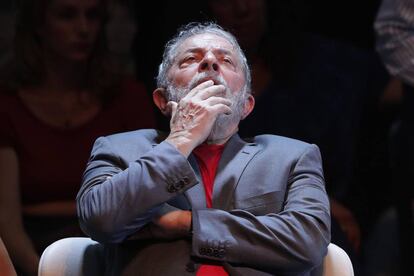After top court rejects his plea, will Brazil’s Lula still have a way to avoid jail?
The same judges who ruled against him could open door to early release as former president continues to appeal corruption conviction

Brazil is the land of unpredictability, but everything seems to indicate that former president Luiz Inácio Lula da Silva will be going to prison in the coming days. Following a marathon session that began on Wednesday afternoon and ended past midnight, the Federal Supreme Court (STF) decided in a narrow six-to-five vote to reject Lula’s plea to remain free while he continues to appeal a corruption conviction.
Although the popular politician might get out again in a few weeks if a new appeal is put to the vote in the STF, prison seems unavoidable right now for the one-time president who was planning to run for re-election in October.
This is a tragic day for democracy
Workers Party
Doing prison time will almost certainly ruin Lula’s chances to run even though opinion polls show him to be the current favorite to win the presidential elections. It will also widen the divide within Brazilian society, where at least a third of voters, according to the polls, view Lula’s conviction as revenge by the country’s elites against the working-class man who held the highest office in the land from early 2003 to the end of 2010.
Others will see it as a sign that judicial probes into widespread corruption will not be stopped, and that the courts have proven that nobody is above the law.
An open door out of prison

Lula could see the inside of a prison as early as next week. The court that found him guilty may issue an order to report to prison authorities at any moment. Lula’s lawyers could win a little time with a new appeal, but it is certain to be swiftly dismissed.
However, the same high court that just paved the way for his incarceration could show him the way out in just a few weeks. This is because one of the STF justices, Rosa Weber, whose vote was pivotal in the Thursday decision, is personally opposed to prison for defendants whose convictions are still being appealed.
On Thursday, Weber decided to abide by a 2016 ruling by her own court stating that defendants whose convictions have been upheld in a first appeal can be jailed. But Lula’s lawyers have asked the STF to address the question of constitutionality in such cases. On such a matter, Weber would almost certainly vote against prison for defendants who are still exhausting their appeals. This would play in Lula’s favor.
Guilty of corruption
Although Lula, 72, was convicted of taking the equivalent of $1 million in bribes from engineering company OAS in exchange for help securing contracts from the state oil company Petrobras, many in Brazil still view him as a scapegoat in a political system where hardly any high-profile figure is safe from suspicion. The Lula case is an offshoot of Operation Lavajato (Car Wash), a huge investigation into corruption that has ensnared numerous political and business leaders.
The fact that the military weighed in at the last minute to “repudiate impunity,” suggesting support for Lula’s imprisonment, has provided fresh arguments to his supporters.
The military weighed in at the last minute to “repudiate impunity”
In July, Lula was found guilty of accepting bribes in the shape of renovations to a beachfront apartment courtesy of OAS, and sentenced to nine-and-a-half years in prison. An appeals court upheld that decision and extended the sentence to 12 years. He is still facing other corruption probes in connection with the Car Wash investigation.
Outside the STF courthouse, familiar scenes played out. Lula detractors dressed in the colors of the national flag danced and played drums, while his supporters, wearing red shirts and carrying Lula dolls, shed tears.
Inside, judges made long speeches peppered with references to case law, fundamental rights and Brazilian history. Justice Celso de Mello came down hard on the commander of the army, General Eduardo Villas-Boas, for his tweet against impunity, which he viewed as a form of pressure against the justice system in a country that endured a military dictatorship between 1964 and 1985. “It is unacceptable,” said Celso de Mello.
Just minutes after the court issued its decision, the Workers Party released a statement: “This is a tragic day for democracy.”
English version by Susana Urra.
Tu suscripción se está usando en otro dispositivo
¿Quieres añadir otro usuario a tu suscripción?
Si continúas leyendo en este dispositivo, no se podrá leer en el otro.
FlechaTu suscripción se está usando en otro dispositivo y solo puedes acceder a EL PAÍS desde un dispositivo a la vez.
Si quieres compartir tu cuenta, cambia tu suscripción a la modalidad Premium, así podrás añadir otro usuario. Cada uno accederá con su propia cuenta de email, lo que os permitirá personalizar vuestra experiencia en EL PAÍS.
¿Tienes una suscripción de empresa? Accede aquí para contratar más cuentas.
En el caso de no saber quién está usando tu cuenta, te recomendamos cambiar tu contraseña aquí.
Si decides continuar compartiendo tu cuenta, este mensaje se mostrará en tu dispositivo y en el de la otra persona que está usando tu cuenta de forma indefinida, afectando a tu experiencia de lectura. Puedes consultar aquí los términos y condiciones de la suscripción digital.









































